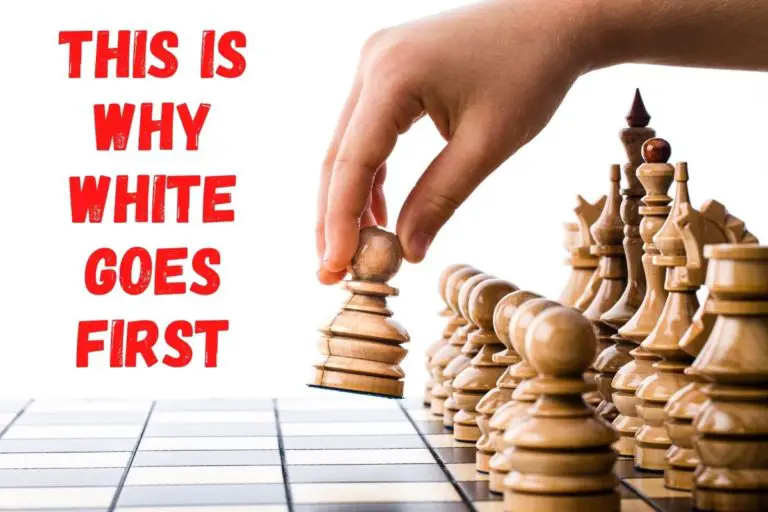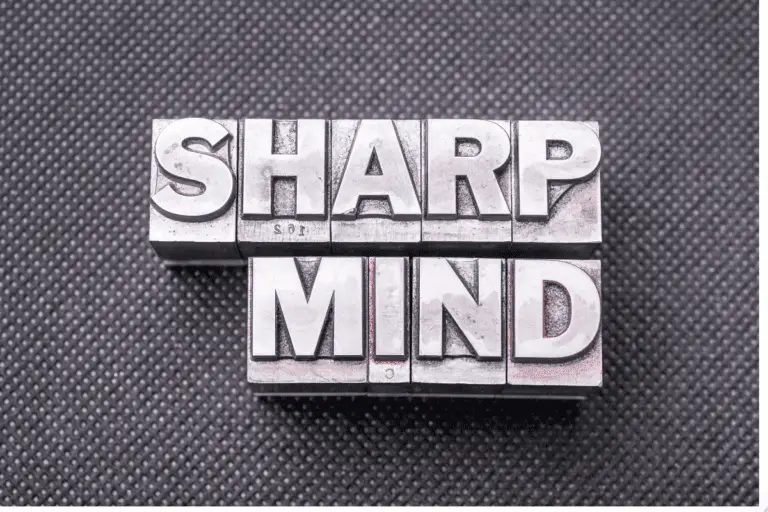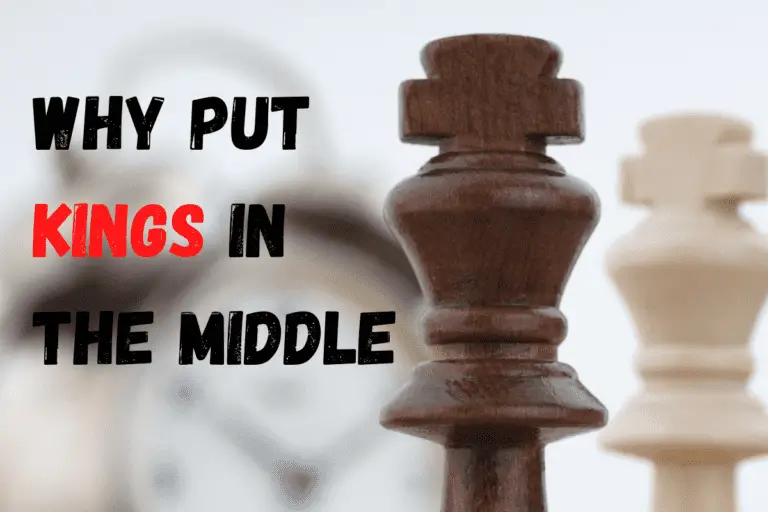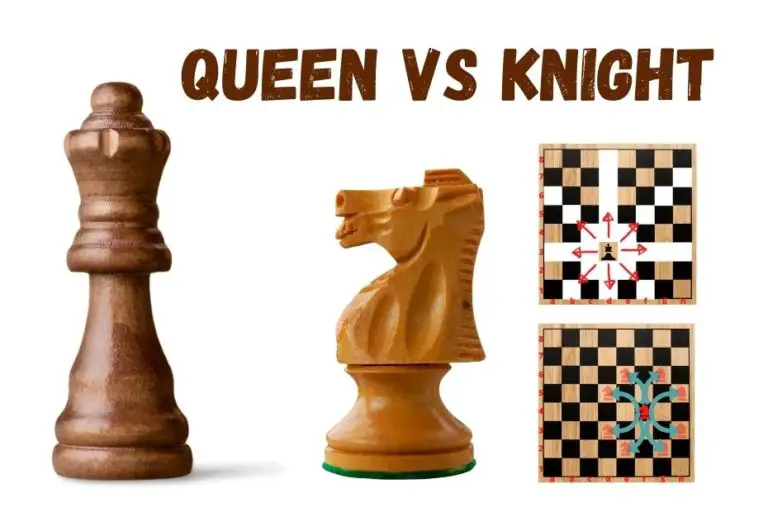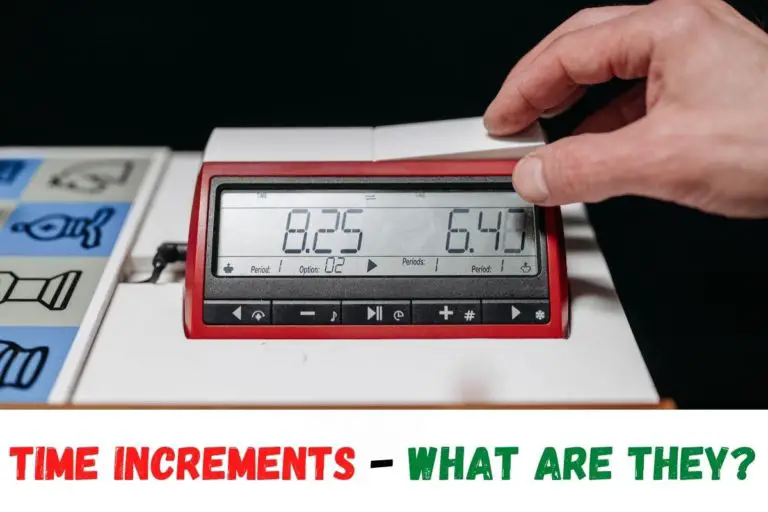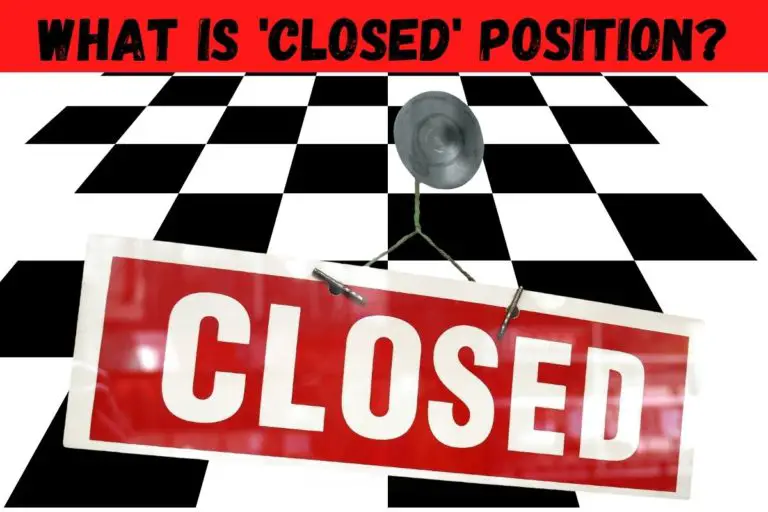Chess Etiquette: When to Resign and How to do it Properly
⭐⭐⭐ Take 8 minutes to read and improve your chess game ➡️ : This article was first published on, and is Copyright of Chessquestions.com
When is the right time to resign from a game of chess? It’s only when there is no chance of winning or drawing. If you think that your opponent has an overwhelming advantage and you can’t see any way you can turn it around, then it’s time to resign.
The reason Chess players resign in a game is that their opponent has an overwhelming advantage and they can’t see any way to turn it around. Respect is also given with resignation to a strong player, and you’ll rarely find the best players in checkmate before resigning.
The article provides some examples of games where players have resigned, as well as etiquette for how to do so correctly. There are also a few puzzles in the article for enthusiasts of chess who want more practice at recognizing resignation situations!
Join me as I delve deeper into the right time to resign when to avoid resigning and play for a draw and the hows and whens of chess resignation for your skill level.
Know The Right Time to Resign
Knowing when to resign in chess, can save energy, time and face the abyss of a lost cause. Playing on when beaten in chess is not pretty and can be disrespectful to your opponent, sometimes. So when is it the right time?
You can resign when it becomes clear to you that you have no hope of winning or making a draw in the game.
By resigning, you save your energy and time. You don’t need to play till the checkmate.
If you don’t resign, your opponent has to checkmate you after which you are given a loss.
Often a lot of beginners with fewer experiences don’t know how they can end the game. So they keep playing till the very last move, fighting for a lost cause and putting themselves in an embarrassing position.
Resignation is perfectly within the rules of the game and there’s nothing wrong with it. You will rarely find the very top chess masters playing a game to checkmate in tournament chess.
5 Reasons to Resign in Chess
These are the 5 most common reasons why you would find a player in an official chess game, making the decision to resign.
1. It’s the right moment
While playing the game it can quickly start to feel like you are being outplayed by your opponent and find yourself in a desperate position. Once you are playing tournaments it becomes increasingly easy to know when you won’t be able to win or a pending inevitable checkmate. Once you have lost a few pieces or simply see that you are being outplayed it is the right moment to resign the game.
2. Accept Defeat
Whether a game is only lasting a few minutes, or you are playing a game with no time limit, once you see that defeat is unavoidable, over the long term, especially in a big tournament when you expect to play many games, resigning can save you plenty of time. Conserve your metal energy for games to come.
3. Show Respect
If you know you are heavily outmatched, in a tricky position and playing against someone who is considerably better than you, it shows respect when you accept your defeat when clearly in no position to gain even a draw or there is an imminent checkmate. Do not force your opponent into playing through to the inevitable.
4. Don’t Waste Time
More applicable when taking part in any type of tournament, you mustn’t be wasting your own or your opponent’s time. You may be able to grab some extra time between matches to consider your strategy for your next opponent. Your opponent will thank you for providing them the same opportunity and not playing on with insufficient material for checkmate.
5. Prepare for the next game
Interchangeable with the above really. Resigning a game early will mean that you and your opponent have a few free minutes to prepare for the next match that you may not have had.
When Should You NOT Resign?
Some chess players give up too soon, which stops them from becoming better chess players. As much as other skills are important in chess, you also need to have a mentality of a fighter who refuses to give up soon. Here are some cases, when you should not give up –
● You see the tiniest ray of hope to make a draw – Even if you have a very small hope of making a draw, you should keep on playing. This way, you will create maximum problems for your opponent to win the game. If your opponent does go wrong, you will make a draw, instead of losing the game.
● When you have a winning position – It’s surprising how many players have resigned in winning positions and not recognized a potential checkmate sequence. This has also happened in the games of elite Grandmasters. There are some positions in chess that look absolutely lost at first but are actually winning. In such positions, it’s important to keep a calm head and continue playing the best move.
● You have a losing position but your opponent cannot convert the advantage – Grandmasters often don’t resign against weaker players, even when they have a completely lost position on board. They might resign in the same position against similar strength or stronger opponents, but not against weaker ones. Why?
It’s not a form of disrespect as often a weaker player lacks the skill required to exploit an advantage, identify a complete checkmate sequence. They might miss tactics, they might allow a stalemate, etc. A stronger player won’t make such a mistake. The grandmaster knows the difference and hence keeps playing.
● When your opponent is in time trouble – In time trouble, the chances of making a mistake go up. This could often mean that your opponent can make mistakes and lose their advantage in time control games. In some cases, it could also mean that they get flagged and lose the game on spot. Keep fighting in such situations and make the most if you gain a time advantage.
What Happens When You Resign?
There are 3 ways to lose a game, one of them is resignation, while the others are getting checkmated and losing on time. What actually happens in a club game or tournament when you make the decision to resign?
Resignation is a voluntary way of accepting defeat and it’s treated as a loss. In a tournament, this means you get no point for that round.
Is There a Point When You Have to Resign? How do you Resign?
Resignation is entirely your choice and you can use it whenever you don’t feel like continuing the game.
Let’s see what is the correct etiquette to do it in online chess, pre-covid and post covid times
● Online Chess – Find the “Resign” button and click it, preferably before an upcoming checkmate.
● Pre-Covid Times in a chess tournament – Stop the clock and shake hands with your opponent. This is how the professionals did it before the coronavirus came along.
At the beginner level, you’ll find a lot of players dropping their king and saying “I resign”. That isn’t necessary. Chess teachers should put you right on this. Do not drop your king under any circusmstance.
● Post-Covid Times in a chess tournament – Stop the clock. No need to shake hands with your opponent or your chess friends.
In chess literature, the terms – “stop the clock” and “resigning”, are often used interchangeably.
Should Resignation be Recorded?
Write the score of the match on your scoresheet and both, you and your opponent have to sign it. Signing the scoresheet means you have officially accepted defeat.
- If White wins and Black loses, write it as 1-0.
- If White loses and Black wins, write it as 0-1.
Usually, there’s a separate space for the signature of both the players. But if there isn’t any such space, sign it below the written score.
So if you lost with the White pieces, write the score as 0-1, sign the scoresheet, and vice versa.
Why do Many Players Resign as soon as the Queen is Captured?
The Queen is the most powerful piece on the chessboard. When your opponent has an extra queen and you don’t, it means they have a big advantage that is often more than enough to win. That’s why a lot of players stop the clock after this piece is captured. However, exceptions do exist.
But let’s say you give up your queen and get some form of compensation in return(like 2 rooks for queen or rook + bishop for queen), then it doesn’t make sense to resign. In those cases, it is better to continue playing.
What About Offering a Draw?
A draw is a better option than resigning in chess. Here are the points you get on either of the results –
- Win – 1 point
- Draw – 0.5 points (Half point)
- Loss – 0 point
So by making a draw, you at least get 0.5 points in chess. However, your opponent can either accept or reject your draw offer. So if they are in a winning position, it’s less likely that they will accept it.
But what if you offer them a draw in an equal position? Do they accept it or reject it. This has been covered in our article – ‘When to Offer a Draw in Chess?’
Examples of When to Resign
Perhaps a famous game in which one player resigns, with an explanation as to what happened and why they made the decision to resign the game
Let’s take an example from the Finale of the hit TV series, Queen’s Gambit.
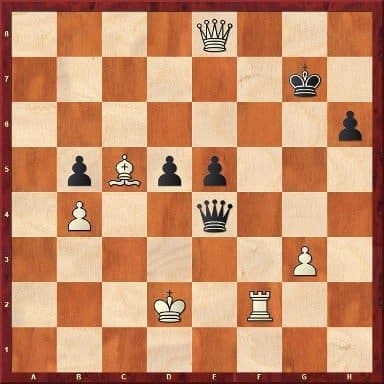
Queen’s Gambit Final Game of The World Championship
In the game, it’s Black’s turn. Since there is no reasonable way for their queen to give a check, Borgov resigns. Also, Borgov, who is shown as the world champion in the TV series, knows that Elizabeth is a strong opponent who can easily win the game from this position.
It might make sense to play a few more moves in this position against weaker opposition to test if they can actually win the position. But against Elizabeth Harmon, who is equally(or more) skilled than Borgov, it would be a waste of time, not to mention the embarrassment of playing the positions in front of the whole world.
In another hypothetical position, it’s White to play and they’re material down. Should they resign?
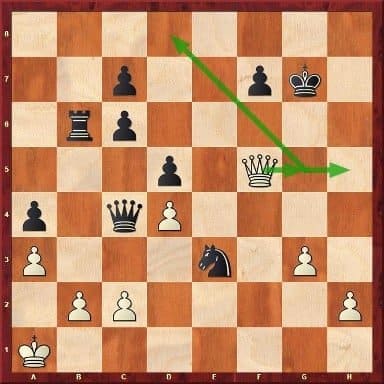
No! They should not resign as they have a draw with the pattern Qg5-Qh5-Qg5-Qd8. So after,
- Qg5+ Kh7
- Qh5+ Kg8
- Qg5+ Kf8
- Qd8+ Kg7
- Qg5+
The position is drawn. There is no way for Black to escape the perpetual checks and find a safe hiding spot for their king. This is a very basic example but the point that I’m trying to illustrate is that White makes a draw if they keep their cool and play the best move. Giving up wouldn’t be the best choice.
Conclusion
We hope it’s clear to you when you should and when you shouldn’t give up in a chess position. To become a stronger player it is important to fight in losing positions. But you should also be able to see an inevitable upcoming checkmate, your disadvantage in material and know when to resign, so as to save your energy and time to prepare for the coming games. It is your personal decision, but you’ll know the proper moment to resign.

